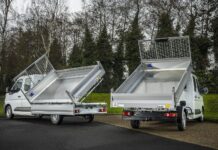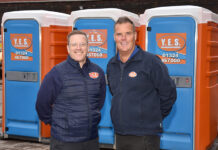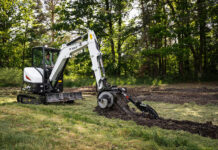
When mini-excavators were first introduced to the British market in the 1970s, some scoffed at the concept. As Kubota celebrates its 50,000th excavator sale in the UK and Eire, Project Plant’s Gary Moug speaks to long-time dealer Young Plant Sales about the brand’s impressive success
KUBOTA UK announced earlier this year that it had sold its 50,000th excavator in the British and Irish market.
Half of those machines have been purchased in the past ten years alone, with the brand being particularly well known on these shores for mini-excavators.
It’s all a far cry from the early days of the late 1970s when workers in the construction industry often poured scorn at the idea of using a mini-digger. In fact, in 1979 just 41 Kubota machines in total were sold. It took five years to reach the 1000 mark.
By the late 1980s, the sector had started to realise what the machines were capable of and around 1000 models were sold annually. By 1998, Kubota had sold its 10,000th machine in the UK and Ireland, and this figure rose to 25,000 by 2006.
Stirling-based Young Plant Sales has been with Kubota on every step of the journey. The company’s founder, Tom Young, signed a deal in May 1979 to become one of the first Kubota dealers in the UK. 37 years later, the firm has sold over 6000 of the machines and is now the longest-serving dealer.
Tom’s son, Brian, the current managing director of Young Plant Sales, recalled the initial difficulty in selling mini-excavators to a sceptical Scottish market.
“The mini-diggers were met with derision,” Brian told Project Plant. “We initially had one machine in the range – the KH10, which had a very square box cab and a fixed boom at right angles on the front. You could slide the boom from one side of the cab to the other. It wasn’t very easy to work but it did the job. You could dig hard up against a wall on either side.
“Nobody had seen a mini-digger before. The smallest tracked excavator anyone was operating was probably a 10.5 tonne Priestman. I had no experience at all of selling any kind of equipment and the day I started, my dad handed me a brochure on the KH10 and told me to go out and sell it. Off I went in my van and went banging on doors without having a clue who could be a potential customer and without having had any product or sales training in the slightest.
“I just started driving around building sites and industrial estates looking for people I thought might want to buy a mini-digger. I ended up on a lot of sites where people took the mickey mercilessly out of me for selling a “Dinky toy” or “Tonka truck”. I was told to go away and come back with a “real” machine.
“The going was very tough. We bought four machines from Kubota in the first year. We only retailed two of those. One we kept as a demonstrator and one was a brand new stock machine. The very first one went to a company in Aberdeen and the second went up to Shetland.”

Brian said the turning point was offering customers a free trial. Once they saw the machines in action, any notion of them being glorified toys was long forgotten.
Brian explained, “The way we got it to work in the end was to put the machines out on site and give people a free demonstration. When they came to talk about hiring, because they all thought it was a toy, we would agree to charge by the metre rather than the hour because we knew it was a very capable digger.
“Once people did give them a trial on site, it totally changed their opinion of the machines and we started to build on limited success, which grew over the years to the point where we sold 760 to our best customer in 2007.”
The Kubota dealership has been a huge success story for Young Plant, who exhibited a special-edition gold KX-71 machine, created to mark the 50,000th sale, at ScotPlant earlier this year.
As well the machines, Young Plant also stock a substantial amount of Kubota spare parts and accessories.
“The machines are extremely reliable,” Brian added. “Kubota make most of the components themselves. They are the biggest compact diesel engine manufacturer in the world by a country mile. Their engines are extremely reliable and their diggers are extremely reliable.
“First and foremost they have reliability. They then have incredibly productive and smooth hydraulic systems, so the operators love them. And because they’re rugged, they hold their value very well.
“The operators like them, the owners and contractors like them because they get the job done with minimum fuss and the investment pays for itself in terms of what it’s done and how much they can be sold for second hand.”











